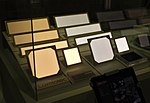define an organic compound as a chemical compound that contains a carbon–hydrogen or carbon–carbon bond; others consider an organic compound to be any...
21 KB (2,288 words) - 10:23, 22 December 2024
Volatile organic compounds (VOCs) are organic compounds that have a high vapor pressure at room temperature. They are common and exist in a variety of...
71 KB (7,747 words) - 05:00, 19 December 2024
Organic chemistry is a subdiscipline within chemistry involving the scientific study of the structure, properties, and reactions of organic compounds...
39 KB (4,388 words) - 19:04, 25 November 2024
compounds generally carry out typical addition reactions that are not possible with saturated compounds such as alkanes. A saturated organic compound...
5 KB (482 words) - 00:17, 16 October 2024
inorganic compound is typically a chemical compound that lacks carbon–hydrogen bonds—that is, a compound that is not an organic compound. The study...
5 KB (525 words) - 11:00, 8 November 2024
heterocyclic compound or ring structure is a cyclic compound that has atoms of at least two different elements as members of its ring(s). Heterocyclic organic chemistry...
20 KB (1,019 words) - 10:03, 11 December 2024
Benzoin (/ˈbɛnzoʊ.ɪn/ or /-ɔɪn/) is an organic compound with the formula PhCH(OH)C(O)Ph. It is a hydroxy ketone attached to two phenyl groups. It appears...
8 KB (571 words) - 01:21, 25 December 2023
chemical nomenclature, the IUPAC nomenclature of organic chemistry is a method of naming organic chemical compounds as recommended by the International Union...
40 KB (4,523 words) - 00:17, 12 December 2024
Organochlorine chemistry (redirect from Chlorinated organic compound)
is concerned with the properties of organochlorine compounds, or organochlorides, organic compounds containing at least one covalently bonded atom of chlorine...
18 KB (1,954 words) - 16:13, 15 December 2024
Metal-organic compounds (jargon: metalorganics, metallo-organics) are a class of chemical compounds that contain metals and organic ligands, but lacking...
1 KB (180 words) - 13:35, 28 December 2023
In organic chemistry, hydrocarbons (compounds composed solely of carbon and hydrogen) are divided into two classes: aromatic compounds and aliphatic compounds...
5 KB (297 words) - 05:18, 11 December 2023
Organic synthesis is a branch of chemical synthesis concerned with the construction of organic compounds. Organic compounds are molecules consisting of...
26 KB (2,550 words) - 18:20, 18 November 2024
Organic matter, organic material, or natural organic matter refers to the large source of carbon-based compounds found within natural and engineered, terrestrial...
23 KB (2,932 words) - 16:02, 18 December 2024
A cyclic compound (or ring compound) is a term for a compound in the field of chemistry in which one or more series of atoms in the compound is connected...
28 KB (3,302 words) - 14:18, 13 November 2024
organic compounds Organic compound, a compound that contains carbon Organic chemistry, chemistry involving organic compounds Organic farming, agriculture...
3 KB (461 words) - 21:42, 23 October 2022
Persistent organic pollutants (POPs) are organic compounds that are resistant to degradation through chemical, biological, and photolytic processes. They...
39 KB (5,194 words) - 21:39, 9 August 2024
Vinyl (redirect from Vinyl (organic compound))
polymer Vinyl cation, a type of carbocation Vinyl group, a broad class of organic molecules in chemistry Vinyl polymer, a group of polymers derived from...
1 KB (196 words) - 11:15, 9 August 2024
An organic acid is an organic compound with acidic properties. The most common organic acids are the carboxylic acids, whose acidity is associated with...
10 KB (1,203 words) - 22:29, 14 August 2024
Halocarbon (redirect from Organic halogen compound)
synthetic organic compounds such as plastic polymers, and a few natural ones, contain halogen atoms; they are known as halogenated compounds or organohalogens...
17 KB (1,893 words) - 07:22, 9 August 2024
Chirality (chemistry) (redirect from CHIRAL COMPOUND)
element is a stereogenic center, or stereocenter. In the case of organic compounds, stereocenters most frequently take the form of a carbon atom with...
31 KB (3,668 words) - 19:51, 16 December 2024
In organic chemistry, nitro compounds are organic compounds that contain one or more nitro functional groups (−NO2). The nitro group is one of the most...
17 KB (1,790 words) - 16:48, 5 November 2024
Organic reductions or organic oxidations or organic redox reactions are redox reactions that take place with organic compounds. In organic chemistry oxidations...
6 KB (672 words) - 19:09, 3 March 2024
α,β-Unsaturated carbonyl compounds are organic compounds with the general structure (O=CR)−Cα=Cβ−R. Such compounds include enones and enals, but also...
10 KB (1,118 words) - 09:04, 11 December 2024
Nitrogen (redirect from Organic nitrogen)
cryogenic applications. Many industrially important compounds, such as ammonia, nitric acid, organic nitrates (propellants and explosives), and cyanides...
105 KB (12,228 words) - 09:07, 17 November 2024
Nitrile (redirect from Organic cyanide)
In organic chemistry, a nitrile is any organic compound that has a −C≡N functional group. The name of the compound is composed of a base, which includes...
31 KB (3,599 words) - 15:54, 6 November 2024
chemical element except for hydrogen. Organic carbon compounds are far more numerous than inorganic carbon compounds. In general bonds of carbon with other...
13 KB (995 words) - 12:40, 1 July 2024
Aromatic compounds or arenes are organic compounds "with a chemistry typified by benzene" and "cyclically conjugated." The word "aromatic" originates...
21 KB (2,094 words) - 17:10, 6 December 2024
Diazonium compounds or diazonium salts are a group of organic compounds sharing a common functional group [R−N+≡N]X− where R can be any organic group, such...
32 KB (3,281 words) - 05:20, 21 December 2024
An organic acid anhydride is an acid anhydride that is also an organic compound. An acid anhydride is a compound that has two acyl groups bonded to the...
17 KB (1,912 words) - 00:40, 12 December 2024
OLED (redirect from Organic light emitting diode)
electroluminescent layer is an organic compound film that emits light in response to an electric current. This organic layer is situated between two electrodes;...
157 KB (17,672 words) - 10:08, 20 December 2024

















